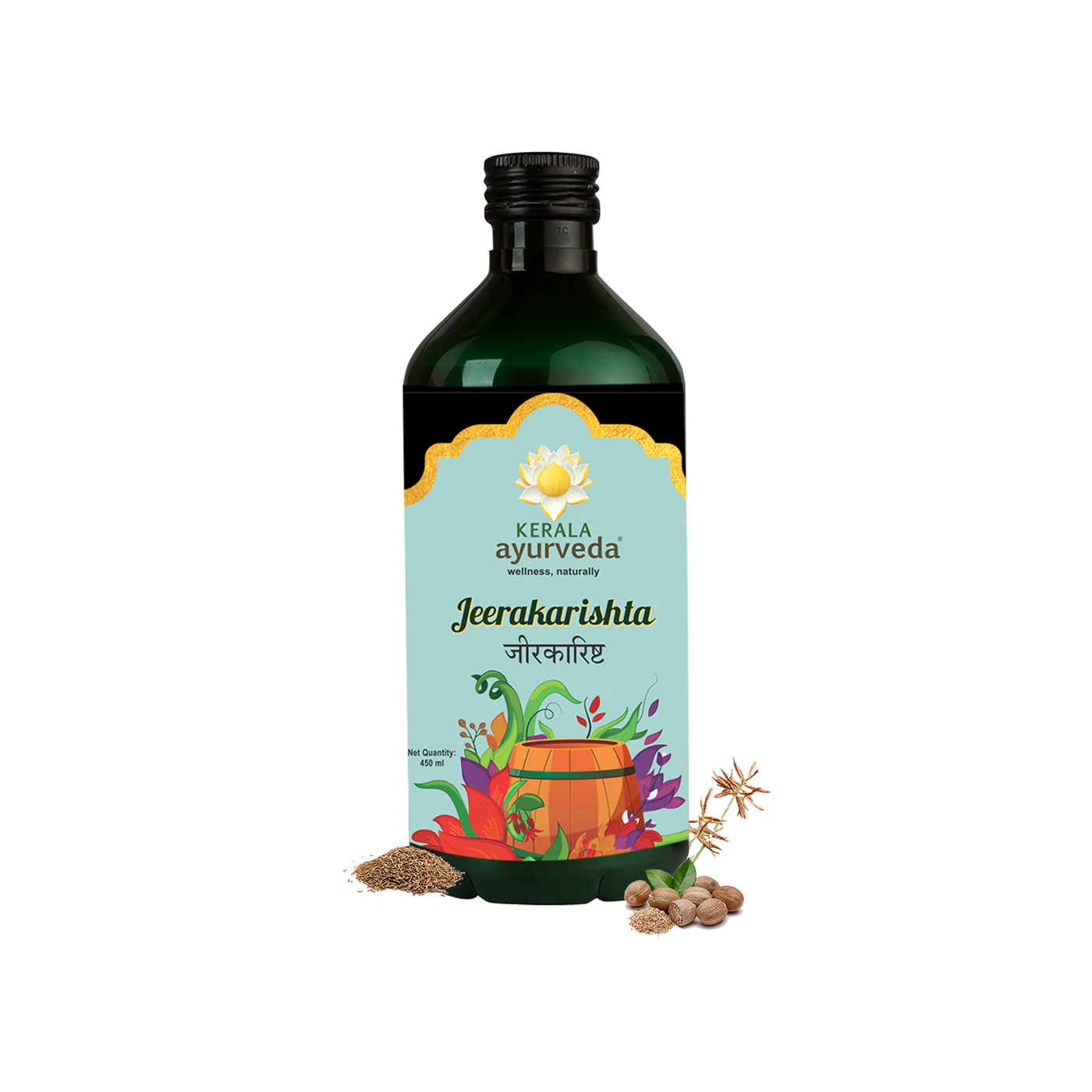Post-Natal Recovery with Jeerakarishtam: An Ayurvedic Tonic for New Mothers

In the journey of motherhood, while the arrival of a new baby is a joyous occasion, it also marks the beginning of a significant period for the mother: postpartum recovery. Often, the focus shifts entirely to the newborn, and rightly so, but it’s equally crucial to remember that a mother’s well-being is paramount. A healthy, recovered mother can better nurture her child and embrace the beautiful challenges of this new chapter.
As an Ayurvedic practitioner with years of experience, I’ve had the privilege of guiding many mothers through this delicate phase. In Ayurveda, the ancient Indian system of medicine, postpartum care is given immense importance, recognizing the profound physiological and emotional changes a woman undergoes. One of the most cherished and effective Ayurvedic formulations for this period is Jeerakarishtam.
Understanding Post-Natal Recovery: A Holistic Perspective
The postpartum period, or Sutika Kala as it’s known in Ayurveda, typically spans 45 days to three months after childbirth, though its effects can linger longer. During this time, a woman’s body works tirelessly to heal from the rigors of pregnancy and childbirth. This involves:
- Uterine Involution: The uterus contracts and returns to its pre-pregnancy size.
- Hormonal Shifts: Hormones like oxytocin and prolactin play a crucial role in lactation, while others that were dominant during pregnancy decline rapidly.
- Physical Exhaustion: The demands of labor, sleepless nights, and constant nursing can lead to significant fatigue.
- Digestive Changes: The digestive fire (Agni) can be weakened, making it harder to process food and absorb nutrients.
- Emotional Well-being: The “baby blues” are common, and some women experience more pronounced postpartum depression, making emotional support vital.
Ayurveda addresses these changes holistically, aiming to restore balance to the body’s Doshas (Vata, Pitta, Kapha), particularly balancing Vata, which can become aggravated during childbirth due to its qualities of movement and dryness.
The Power of Jeerakarishtam: An Ayurvedic Nectar for New Mothers
Jeerakarishtam is a classical Ayurvedic fermented herbal tonic, revered for its specific benefits in postpartum care. The name itself gives a clue to its primary ingredient: Jeeraka, or cumin seeds. But it’s far more than just a cumin concoction. It’s a carefully crafted blend of potent herbs, prepared through a natural fermentation process that enhances their therapeutic properties and makes them easily assimilable by the body.
What Makes Jeerakarishtam So Effective?
Let’s delve into the key reasons why Jeerakarishtam stands out as an exceptional post-natal tonic:
1. Restoring Digestive Strength (Agni Deepana): Childbirth and the subsequent hormonal shifts can significantly dampen the digestive fire. A weakened Agni leads to poor digestion, gas, bloating, and inefficient nutrient absorption, all of which hinder recovery. Jeerakarishtam, with its warm and stimulating herbs, effectively rekindles Agni. Cumin, the star ingredient, is renowned for its carminative properties, alleviating gas and promoting healthy digestion. This is crucial because proper digestion is the cornerstone of overall health in Ayurveda. When a new mother can digest her food well, she can extract maximum nourishment, which is vital for her recovery and for producing good quality breast milk.
2. Supporting Uterine Health and Involution: One of the most important aspects of postpartum recovery is the uterus returning to its normal size and position. Jeerakarishtam aids this process, known as garbhashaya shodhana (uterine cleansing). The herbs in the formulation work synergistically to help the uterus contract efficiently, expelling any residual impurities and promoting healthy uterine tissue regeneration. This gentle yet effective action helps prevent complications and ensures a smoother recovery of the reproductive system.
3. Enhancing Lactation (Stanya Janana): For breastfeeding mothers, Jeerakarishtam is a true blessing. Many of its ingredients are known as galactagogues, meaning they help to stimulate and improve the flow of breast milk. This is not just about quantity, but also quality. By improving the mother’s digestion and overall vitality, Jeerakarishtam indirectly contributes to nutrient-rich breast milk, which is essential for the baby’s growth and development. It helps alleviate concerns about insufficient milk supply, allowing mothers to breastfeed confidently and adequately nourish their newborns.
4. Alleviating Vata Imbalance: Childbirth is a profoundly Vata-aggravating event. Vata, associated with movement, air, and space, can become imbalanced, leading to symptoms like anxiety, sleeplessness, joint pain, and digestive issues. Jeerakarishtam, being warm and grounding, effectively pacifies aggravated Vata. It helps to stabilize the nervous system, reduce anxiety, and promote a sense of calm and well-being, which is incredibly important for a new mother navigating sleep deprivation and the emotional roller coaster of early motherhood. This Vata-balancing action also contributes to reducing post-delivery body aches and pains, helping the mother feel more comfortable and mobile.
5. Boosting Overall Strength and Immunity (Balya and Rasayana): The postpartum period can leave a woman feeling depleted and vulnerable. Jeerakarishtam acts as a rasayana, an Ayurvedic rejuvenative tonic, meaning it helps to restore vitality and build Ojas, the subtle essence of immunity and well-being. By strengthening the mother’s core energy, it helps her cope with the demands of motherhood, improves her resilience, and boosts her natural immunity, making her less susceptible to infections during this crucial period of recovery. It provides sustained energy, preventing the dips and crashes that can come with chronic fatigue.
6. Gentle and Natural Approach: One of the greatest advantages of Jeerakarishtam is its natural and gentle approach. Unlike synthetic supplements that might target specific symptoms, Jeerakarishtam works holistically, addressing the root causes of imbalances. It’s a traditional remedy that has been used safely and effectively for centuries, providing peace of mind to new mothers who are often cautious about what they put into their bodies while breastfeeding.
Key Ingredients and Their Benefits
While the exact formulation can vary slightly between manufacturers, some common and beneficial ingredients in Jeerakarishtam include:
- Jeeraka (Cumin): As mentioned, it’s excellent for digestion, dispelling gas, and promoting uterine health. It’s also known for its galactagogue properties.
- Dhataki (Woodfordia fruticosa): Used for its fermenting properties, it also supports wound healing and overall strength.
- Guda (Jaggery): Provides natural sweetness and is a source of iron, helping to combat post-delivery weakness.
- Dashamoola: A powerful blend of ten roots, it is renowned for its anti-inflammatory and pain-relieving properties, supporting overall recovery.
- Pippali (Long Pepper): Enhances digestion, improves absorption of nutrients, and has carminative properties.
- Ela (Cardamom): Aids digestion, reduces bloating, and offers a pleasant aroma.
- Twak (Cinnamon): Warming, digestive, and supports healthy blood circulation.
The careful selection and combination of these herbs, along with the traditional fermentation process, create a potent synergy that optimizes their therapeutic effects, making Jeerakarishtam a truly remarkable tonic for post-natal recovery.
How to Incorporate Jeerakarishtam into Your Post-Natal Routine
As with any Ayurvedic preparation, it’s always best to consult with a qualified Ayurvedic practitioner to determine the appropriate dosage and duration based on your individual constitution (Prakriti) and current state of health (Vikruti). However, generally, Jeerakarishtam is taken after meals, diluted with an equal amount of water.
Here are some general guidelines for incorporating it:
- Timing: It is typically started a few days after delivery, once the initial bleeding has subsided and the mother feels ready.
- Dosage: A common dosage is 15-30 ml, twice a day, after meals.
- Consistency: For best results, consistency is key. Continue taking it for at least 45 days, or as advised by your practitioner, to allow your body ample time to recover fully.
- Diet and Lifestyle: Remember, Jeerakarishtam works best when complemented by a wholesome, nourishing diet and adequate rest. Prioritize warm, freshly cooked meals, avoid cold and raw foods, and ensure you get as much rest as possible, even if it’s in short bursts. Hydration is also crucial, especially for breastfeeding mothers.
Beyond Jeerakarishtam: A Holistic Post-Natal Approach
While Jeerakarishtam is an excellent cornerstone, true post-natal recovery encompasses a broader Ayurvedic approach:
- Abhyanga (Self-Oil Massage): Daily warm oil massage with nourishing Ayurvedic oils helps to calm Vata, strengthen tissues, improve circulation, and promote relaxation.
- Warm Water Baths: Avoiding cold baths and opting for warm water is crucial to maintain body temperature and prevent Vata aggravation.
- Rest and Sleep: This cannot be overemphasized. A new mother needs significant rest to heal and replenish her energy reserves. Delegate tasks, accept help, and prioritize sleep whenever possible.
- Mindful Eating: Focus on easily digestible, warm, and nourishing foods. Avoid processed foods, excessive spices, and anything that can aggravate Vata.
- Emotional Support: Surround yourself with a supportive network of family and friends. Don’t hesitate to seek professional help if you experience persistent feelings of sadness or anxiety.
- Gentle Movement: Once your body feels ready and your practitioner approves, incorporate gentle exercises like walking or specific postpartum yoga poses to regain strength and flexibility.
Embracing Your Post-Natal Journey with Ayurveda
The postpartum period is a unique and sacred time. It’s a time for healing, bonding, and embracing the profound transformation into motherhood. By integrating the wisdom of Ayurveda, particularly with potent tonics like Jeerakarishtam, new mothers can not only recover physically but also regain their vitality, emotional balance, and confidence.
As an expert in Ayurvedic postpartum care, I encourage all new mothers to consider this time as an opportunity for profound self-care. Nurturing yourself during this phase is not a luxury; it’s a necessity. It ensures that you have the strength, energy, and well-being to embark on this incredible journey of motherhood with joy and resilience. Trust in the ancient wisdom of Ayurveda to guide you towards a truly holistic and empowering post-natal recovery. Your well-being is the foundation for your family’s well-being.






